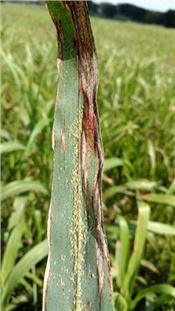New Missouri Pest Sugarcane Aphid Impacts Forage Sorghum In Southwest Missouri

Sugarcane Aphid Cluster taken in field located in Greene County, Missouri.
Photo credit: MU Extension
GALENA, MO.
Several forage sorghum growers in Stone and Green counties this year suffered from a new pest to Missouri according to Tim Schnakenberg, agronomy specialist with University of Missouri Extension.
“I saw several cases of sugarcane aphid nearly destroy fields in Stone and Greene counties in September. Last year was the first time we noticed this pest in forage sorghum. It was first seen in Arkansas in 2014,” said Schnakenberg.
The pest has been known to devastate grain sorghum crops, sorghum sudan hybrids, and sudangrass in the south. The aphids suck sap from the plants by hundreds/thousands of yellow aphids up and down the stalk and leaves.
“Turns out the aphids like the taste of Johnsongrass also,” said Schnakenberg. “This may be the reason we are seeing Johnsongrass turn purple/brown earlier this year than normal.”
Symptoms include a browning and purpling of the mid-lower leaves and in some cases complete die-back of the plant. Large variations of the symptoms may occur from plant to plant.
The good news is the pest seems to come late enough in the season that the early crops have missed the damaged. The second and third harvests seem to be affected the most.
Extension programs in the south are working on threshold levels for control, but this information is still pending.
According to Schnakenberg, there are two registered insecticides that have a label for sugarcane aphid: Sivanto 200SL and Transform WG. Both of these products work better than chlorpyrifos, dimethoate, and malathion on this new pest.
“In most cases, early harvest or grazing is the best approach to control them. If the problem continues in coming years, growers may become more dependent on using pearl millet or foxtail millet for a summer annual. Research in Texas has found that pearl millet and foxtail millet are not be a host for the aphid,” said Schnakenberg. ∆